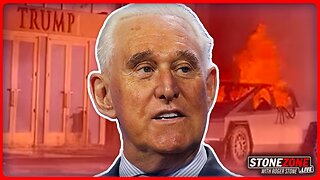Premium Only Content

July 6, 2024
Michael Adkins
*FROM PETER TO GOD’S ELECT*
1 Peter 1:1-2 (NIV)
“Peter, an apostle of Jesus Christ,
To God's elect, exiles scattered throughout the provinces of Pontus, Galatia, Cappadocia, Asia and Bithynia, who have been chosen according to the foreknowledge of God the Father, through the sanctifying work of the Spirit, to be obedient to Jesus Christ and sprinkled with his blood:
Grace and peace be yours in abundance.”
*INTRODUCTION TO FIRST PETER*
Today we move back into the New Testament to begin our study in the epistles of 1st & 2nd Peter. You will find the style quite different from Paul and John, but equally enlightening and hard hitting. As the name indicates, these epistles were written by Simon Peter, a disciple of Jesus the Messiah. It was probably written later in his ministry, most likely when he was in Rome. Tradition tells us that Peter was martyred somewhere between AD 64-68, during Emperor Nero’s persecution of Christians. Nero is attributed to have put Peter to death by hanging him upside down on a cross.
As we will study in 1 Peter, the overall purpose of this epistle is clear. It was written as an exhortation to the church’s in Asia Minor to stand firm in their faith despite the persecution they were experiencing. He wanted the readers to understand their identity in Christ, and
As we will discover, their suffering does not mean they were wrong to follow Christ. Rather, suffering for their faith confirms their identity in Christ, and that we are to be holy, living Godly lives amongst the pagans.
*THE AUTHOR*
_Peter, an apostle of Jesus Christ_
As stated, this letter was written by the Apostle Peter, one of the pillars of the church. His apostleship and calling are unquestionable.
However, there are many modern-day critics who claim that Peter couldn’t have written this letter, primarily because of the quality of the Greek. According to the NIV Study Notes: “It is true, however, that the Greek of 1 Peter is good, literary Greek, and even though Peter could no doubt speak Greek, as so many in the Mediterranean world could, it is unlikely that he would write such polished Greek. It is precisely at this point that Peter’s remark in 5:12 concerning Silas may be significant. Here the apostle claims that he wrote “with the help of” (more lit. ‘through’ or ‘by means of’) Silas.” Additionally, all of the earliest church fathers attested to the authorship of the apostle Peter.
*THE AUDIENCE*
_To God's elect, exiles scattered throughout the provinces of Pontus, Galatia, Cappadocia, Asia and Bithynia, who have been chosen according to the foreknowledge of God the Father, through the sanctifying work of the Spirit, to be obedient to Jesus Christ and sprinkled with his blood_
As usual, writers of the epistles tell us who the letter was specifically written to. Here, Peter gives us a great amount of information not only to their location, but their status in Christ Jesus.
*God’s elect … chosen according to the foreknowledge of God the Father, through the sanctifying work of the Spirit, to be obedient to Jesus Christ and sprinkled with his blood* -
Notice that all three persons of the Godhead are involved in the redemption of God’s chosen people. The Father chose us before the creation of the world, based on his foreknowledge of what we would do (Eph 1:4-14). Jesus Christ, the Son, died for us while we were still sinners (Rom 5:6-10). The Holy Spirit brings us the benefits of salvation and sets us apart (makes us holy) for God’s service (2 Thes 2:13).
The term God’s “elect” (Gr: _eklektos_) which primarily means chosen, has created one of the most difficult theological controversies in the church. Election vs Free-will. And as you can imagine, as I read through various commentators, they had radically different interpretations depending in which camp they belonged to.
However, I read something from Dr. J. Vernon McGee, who was the Pastor of Church of the Open Door for more than 20 years but is most famous for his Through the Bible Broadcast that brings some balance to the issue: “There are certain things which I believe that to me are not contradictory, but they certainly are paradoxical. Election and free will happen to be one of those… There is a theological argument that rages today on election or free will. There are some people who put all their eggs in the basket of election. There are others who put all their eggs in the basket of free will. I’m not proposing to reconcile the two because I have discovered that I cannot. If you had met me the year that I entered seminary, or the year I graduated, I could have reconciled them for you. I never have been as smart as I was my first year and my last year in seminary. I knew it all then. I could reconcile election and free will, and it was a marvelous explanation. Now I’ve even forgotten what it was. It was pretty silly, if you want to know the truth… You can argue about divine election and free will all you want to, but it works. You cannot make it work out by arguing, but it sure works out in life”
Whether you fall into the Election camp, or the Free-will camp, these differences should NEVER cause division in the body of Christ. Our salvation is not based on whether I chose God or God chose me. The key thing, is that we belong to Christ, we follow Christ, and Christ has saved us through our faith in Him.
*exiles scattered throughout the provinces of Pontus, Galatia, Cappadocia, Asia and Bithynia*
Peter lists a broad swath of provinces and regions in what is now known as Turkey. Whether he meant them as the formal province or the broad region is not certain, but it covers much of western and central Asia Minor. The term “exiles”: (Gr: _parepidēmos_) which literally means strangers, foreigners, or possibly pilgrims. Primarily, Peter is reminding the readers that as Christians, they are foreigners and strangers in this world.
Obviously, Peter had some reason for addressing Christians in these particular provinces. While Paul had evangelized many towns in the south-central part of region in is first missionary journey, but it only covered a fairly small area of Asia Minor. On his second missionary journey, he was prevented from preaching in Asia, Bithynia, Pontus and Cappadocia, instead he was called into Macedonia. (Acts 16:6-10). It is highly likely, as the early church historian Eusebius suggests, that Peter had an important part in the evangelization in those regions.
*THE GREETING*
Genesis 11:31-32
_Grace and peace be yours in abundance_
Grace and peace is a very standard greeting used by Paul and Peter in all of their letters, and we see it in the second epistle of John as well. It is the combination of the typical Greek greeting “grace” (Gr: _charas_) with the typical Jewish greeting “peace” (Gr: _eirēnē_), which is the equivalent of the Hebrew: _shalom_.
*APPLICATION*
“To God's elect, *exiles scattered* throughout the provinces ….” As we drill down a bit deeper in the thought of being “exiles scattered”, we realize that we are also included in this description. The combination of these two words provides a powerful description of our position here on earth. “Exiles”: (Gr: _parepidēmos_) as we have seen, literally means strangers, foreigners, or possibly pilgrims. Marvin Vincent in his classic work “Vincent’s Word Studies” adds some depth when he describes _parepidēmos_ as: “Persons sojourning for a brief season in a foreign country.” Think of us as expats, temporarily living in this world, on a special assignment from Jesus Christ himself. In fact, that will be a central message throughout First Peter.
The second word “scattered” (Gr: _diaspora_) is used in other parts of the New Testament to describe the Jews who are scattered across the Greek world. However here, Peter is using it to refer to believers as well: “God’s elect”. Being a _diaspora_, means that we are a people scattered across the world in countries not our own.
As Paul writes: “But our citizenship is in heaven.” (Phil 3:20) When speaking of being citizens of heaven, Gregory Brown said, “People should be able to identify us as citizens of heaven because of the clothes (righteousness, patience, forgiveness, compassion, humility, and love) that we wear, the attitudes we display. Our position in Christ should affect everything.” As expats, we realize that this world is not our home. We do not set our hearts on the things of this world, nor do we store up treasure where moth and rust can destroy. We, as citizens of heaven, do what Colossians 3:1-2 tells us to do, “Since then, you have been raised with Christ, set your hearts on things above, where Christ is, seated at the right hand of God. Set your minds on things above, not on earthly things.”
As citizens of heaven, Christ has blessed us with every spiritual blessing in the heavenly places (Ephesians 1:3). We are a new creation, and the old has passed away (2 Corinthians 5:17). We have such glorious promises both now and, in the future, to come as citizens of heaven and Christ Jesus as our King.
-
 1:00:32
1:00:32
Man in America
15 hours ago🔴 LIVE: Terror Attacks or False Flags? IT DOESN'T ADD UP!!!
98.1K36 -
 1:02:38
1:02:38
Donald Trump Jr.
16 hours agoNew Year’s Terror, Latest Breaking News with Sebastian Gorka | TRIGGERED Ep.204
221K447 -
 59:59
59:59
The StoneZONE with Roger Stone
11 hours agoAfter Years of Targeting Trump, FBI and DOJ are Unprepared to Stop Terror Attacks | The StoneZONE
79.3K28 -
 1:26:42
1:26:42
Leonardaisfunny
10 hours ago $5.81 earnedH-1b Visas: Infinity Indians
52.9K28 -
 1:08:33
1:08:33
Josh Pate's College Football Show
15 hours ago $3.22 earnedPlayoff Reaction Special: Ohio State Owns Oregon | Texas Survives | UGA vs Notre Dame Takeaways
46.3K6 -
 58:04
58:04
Kimberly Guilfoyle
14 hours agoFBI's Terror Response Failures, Live with Steve Friend & Kyle Seraphin | Ep. 185
118K48 -
 2:15:01
2:15:01
WeAreChange
15 hours agoMassive Developments In Vegas Investigation! UNREAL DETONATION, Shocking Details Emerge!
123K89 -
 54:02
54:02
LFA TV
22 hours ago2025 Is Off to a Violent Start | TRUMPET DAILY 1.2.25 7pm
55.6K12 -
 59:27
59:27
theDaily302
21 hours agoThe Daily 302- JJ Carrell
46.8K5 -
 2:57
2:57
EvenOut
2 days ago $2.21 earnedTHE TELEPORTING PORTA POTTY TWIN RPANK!
42.6K3